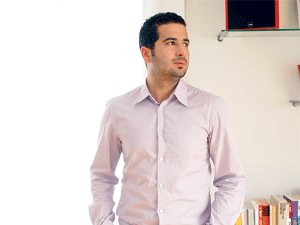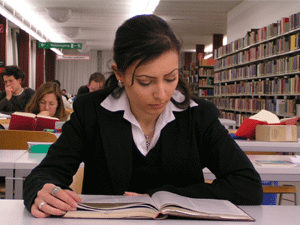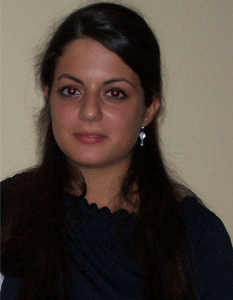New Generation Is Gaining an Education
- Written by Admin TOA
- Published in Euro Turks
Approximately 200 thousand students continue their education at about 320 institutions for higher education (Hochschulen) in Germany. The number of Turkish students attending these universities is 36,000. Only 3% of these are students from Turkey; the rest is composed of Turks born in Germany. (1)
Although each generation gives more attention to education then the previous one, the percentage of students attending universities has not reached the desired level. Young people who have grown up in Germany as members of worker families are trying to build up their careers.

Bielefeld University was founded in 1969 to establish unity between research and teaching. Close to 1000 Turkish students attend this state university, located in the largest city of East Westphalia
Of the approximately 17,000 students attending the university, 2000 are foreign students from 104 different countries. The foreign students come mainly from countries such as Turkey, South Korea, Greece, China, Russia and Poland.
Bielefeld University has 18 departments in disciplines such as law, biology, history, chemistry, literature, mathematics, technology, pedagogy, philosophy, economics, and sociology, and is the choice of a new generation of students looking forward to a career.
"I’M GLAD TO SEE A FEMALE STUDENT"
Hilal Aksu is one of the students completing her studies in law. She says that when she started school, 100 of the 350 students in her class were foreigners, Turks being in the majority. However, the number of Turkish students in her classes was lower last year. Daughter of a mother from Denizli and a father from Afyon, Aksu is the pride of her family, which has been living in Germany for 35 years.
Among her friends, she was one of the few who wanted to advance her education and pursue a career. She states that many of her friends are married and have children. She says, “I’m glad to see a Turkish female student.” She thinks that the number of students who attend college to escape from family pressure is not small. Right now, she is preparing for the bar exams. Aksu was born in 1981, and in the town of Bunde, where she lives, is the vice president of the Foreigner Council of the Green Party.

She is also in the governing body of the Turkish-German Students and Faculty Communication and Solidarity Platform (BUTAP) of Bielefeld University. The association has about 260 members, but not everyone is active. Through activities they are trying to get their name known. Aksu emphasizes the fact that the students don’t have a tendency to come together and act together. Activities which attract the most attendance are parties open to all students.
Although not a lawyer yet, she helps Turks around her with legal matters. She says, “I’d like to go into politics in the future.”
SECOND CLASS CITIZEN
She complains of continuously being treated as a second class citizen, although she was born and raised here. “I can’t see Germany as my homeland. Turkey is closer,” she says.
Aksu, who thought she would not have any difficulties finding a job when she chose to study law, now is not of the same opinion. Like many young people in Germany, she is afraid she will not find employment. This successful student says that she can practice law in Turkey or in any other EU country. Besides German, she speaks English and French. To become a lawyer she has to pass two exams. She will obtain the right to an internship after the first exam. The second exam takes place after the internship.
The biggest need of second generation Turkish students is family support. Young people raised between two cultures, in general, choose to marry, and forego continuing their education. Different difficulties lie ahead for idealistic students wishing to pursue a professional career. Aksu is one of the lucky ones. Her mother Nuriye Aksu, who resigned from public office to immigrate to Germany 32 years ago, says that they provided all possible support and will continue to do so.
Before immigrating to Germany when she was 18, Nuriye Aksu attended the teacher training college in Bursa, and worked three years at the public education center. Having joined the work force at an early age, but not being able to pursue a professional career, she is very attentive to her daughter Hilal.
ALEV KARA: TRUST IS LACKING
Alev Kara, who studies pedagogy at the same school, states that the young generation is not continuing education either because they have no role model in their families, or because of a lack of confidence.
Students can attend universities according to their performance in the four different types of middle and high school (Hauptschule, Gesamtschule, Realschule and Gymnasium). Anybody who goes to a Gymnasium and studies for 13 years attains the right to study any subject they wish to at university.

But there are not many Turkish students attending this type of school. Alev Kara is one of two children in the Kara family, which came from Kirsehir, and which has lived in Bunde for 25 years. After her education at the Gymnasium, she chose to study pedagogy at Bielefeld University. Following her grandfather and father, who immigrated in 1961, she is the third generation. She says that people will look at you differently if you continue your education, even non-Turks.
Because of a lack of German, many parents cannot help, and the children have to struggle with their studies. Kara, together with some friends attending the university, expresses the desire to help children with bad grades on the weekends. But this wish hasn’t been realized yet.
Alev Kara states that her family was an important factor in her decision to attend university. “Some of my friends have chosen vocational schools, some are married. There haven’t been many trying a chance at a university.” She believes that the reason for not going to school is not because of pressure from family or financial difficulties, but because of the student’s choice. Her mother Fatma Kara, who didn’t have the opportunity to continue her education after high school, states they will provide all the support necessary.
“Because the parents are not aware and they lack German, they don’t care much for their children. There are not many who direct their children.” She mentions that only four of the 100 students attending the Gymnasium were Turkish, and adds that the perspective of the new generation towards a university education is noteworthy.
Fatma Kara, who immigrated after marrying her husband Ramazan Kara, says that parents sometimes have difficulties making their children do what they say, and that this has a negative effect in terms of children continuing their education.
(1) Prof. Faruk Sen, Center for Studies on Turkey.
(May 2006, 20th Issue)

Serdar Sahin.
Bielefeld University was founded in 1969 to establish unity between research and teaching. Close to 1000 Turkish students attend this state university, located in the largest city of East Westphalia
Of the approximately 17,000 students attending the university, 2000 are foreign students from 104 different countries. The foreign students come mainly from countries such as Turkey, South Korea, Greece, China, Russia and Poland.
Bielefeld University has 18 departments in disciplines such as law, biology, history, chemistry, literature, mathematics, technology, pedagogy, philosophy, economics, and sociology, and is the choice of a new generation of students looking forward to a career.
"I’M GLAD TO SEE A FEMALE STUDENT"
Hilal Aksu is one of the students completing her studies in law. She says that when she started school, 100 of the 350 students in her class were foreigners, Turks being in the majority. However, the number of Turkish students in her classes was lower last year. Daughter of a mother from Denizli and a father from Afyon, Aksu is the pride of her family, which has been living in Germany for 35 years.
Among her friends, she was one of the few who wanted to advance her education and pursue a career. She states that many of her friends are married and have children. She says, “I’m glad to see a Turkish female student.” She thinks that the number of students who attend college to escape from family pressure is not small. Right now, she is preparing for the bar exams. Aksu was born in 1981, and in the town of Bunde, where she lives, is the vice president of the Foreigner Council of the Green Party.

Hilal Aksu.
She is also in the governing body of the Turkish-German Students and Faculty Communication and Solidarity Platform (BUTAP) of Bielefeld University. The association has about 260 members, but not everyone is active. Through activities they are trying to get their name known. Aksu emphasizes the fact that the students don’t have a tendency to come together and act together. Activities which attract the most attendance are parties open to all students.
Although not a lawyer yet, she helps Turks around her with legal matters. She says, “I’d like to go into politics in the future.”
SECOND CLASS CITIZEN
She complains of continuously being treated as a second class citizen, although she was born and raised here. “I can’t see Germany as my homeland. Turkey is closer,” she says.
Aksu, who thought she would not have any difficulties finding a job when she chose to study law, now is not of the same opinion. Like many young people in Germany, she is afraid she will not find employment. This successful student says that she can practice law in Turkey or in any other EU country. Besides German, she speaks English and French. To become a lawyer she has to pass two exams. She will obtain the right to an internship after the first exam. The second exam takes place after the internship.
The biggest need of second generation Turkish students is family support. Young people raised between two cultures, in general, choose to marry, and forego continuing their education. Different difficulties lie ahead for idealistic students wishing to pursue a professional career. Aksu is one of the lucky ones. Her mother Nuriye Aksu, who resigned from public office to immigrate to Germany 32 years ago, says that they provided all possible support and will continue to do so.
Before immigrating to Germany when she was 18, Nuriye Aksu attended the teacher training college in Bursa, and worked three years at the public education center. Having joined the work force at an early age, but not being able to pursue a professional career, she is very attentive to her daughter Hilal.
ALEV KARA: TRUST IS LACKING
Alev Kara, who studies pedagogy at the same school, states that the young generation is not continuing education either because they have no role model in their families, or because of a lack of confidence.
Students can attend universities according to their performance in the four different types of middle and high school (Hauptschule, Gesamtschule, Realschule and Gymnasium). Anybody who goes to a Gymnasium and studies for 13 years attains the right to study any subject they wish to at university.

Alew Kara.
But there are not many Turkish students attending this type of school. Alev Kara is one of two children in the Kara family, which came from Kirsehir, and which has lived in Bunde for 25 years. After her education at the Gymnasium, she chose to study pedagogy at Bielefeld University. Following her grandfather and father, who immigrated in 1961, she is the third generation. She says that people will look at you differently if you continue your education, even non-Turks.
Because of a lack of German, many parents cannot help, and the children have to struggle with their studies. Kara, together with some friends attending the university, expresses the desire to help children with bad grades on the weekends. But this wish hasn’t been realized yet.
Alev Kara states that her family was an important factor in her decision to attend university. “Some of my friends have chosen vocational schools, some are married. There haven’t been many trying a chance at a university.” She believes that the reason for not going to school is not because of pressure from family or financial difficulties, but because of the student’s choice. Her mother Fatma Kara, who didn’t have the opportunity to continue her education after high school, states they will provide all the support necessary.
“Because the parents are not aware and they lack German, they don’t care much for their children. There are not many who direct their children.” She mentions that only four of the 100 students attending the Gymnasium were Turkish, and adds that the perspective of the new generation towards a university education is noteworthy.
Fatma Kara, who immigrated after marrying her husband Ramazan Kara, says that parents sometimes have difficulties making their children do what they say, and that this has a negative effect in terms of children continuing their education.
(1) Prof. Faruk Sen, Center for Studies on Turkey.
(May 2006, 20th Issue)
Last modified onSaturday, 06 May 2017 10:07
Tagged under
Latest from Admin TOA
- From Dream to Reality, from Muş to Illinois: Zellano Home, the Largest Furniture Store Under One Roof in the USA!
- 300 migrants to be housed at shuttered Catholic church on Northwest Side in Chicago
- Turkish Stand-Up Sensation Hasan Can Kaya Embarks on U.S. Tour with Art Evi Production, in212 Production, and TAAS New York
- "Lean Startup, To Lean Company, To Rich Exit" by Dr. Kenan Sahin is released with Forbes Books
- LOSEV USA Ramadan Campaign Let the Children Heal First with Your Ramadan Donations
